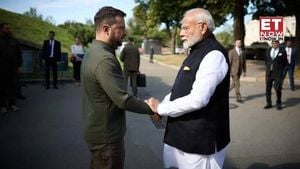The body of Ilan Weiss, an Israeli hostage killed during the October 7, 2023, Hamas attack, has been recovered by Israeli forces in Gaza, according to a statement from the Israel Defense Forces (IDF) on August 29, 2025. Weiss, 56, was killed defending Kibbutz Beeri on that fateful day, a moment that continues to cast a long shadow over both Israeli and Palestinian lives nearly two years later. Alongside Weiss’s remains, the IDF announced the recovery of a second hostage’s body, though the identity of this individual has not yet been made public.
The recovery operation comes amid an unrelenting Israeli military campaign in Gaza, launched after the October 2023 attack in which 1,200 people were killed and 251 taken hostage. According to the Hamas-run health ministry in Gaza, the offensive has resulted in at least 63,025 Palestinian deaths to date—a staggering toll that underscores the conflict’s devastating human cost. The BBC reports that more than 90% of homes in Gaza are now damaged or destroyed, and the territory’s healthcare, water, sanitation, and hygiene systems have collapsed.
Weiss’s story is emblematic of the tragedy that has befallen so many. His wife, Shiri, and daughter, Noga, were also taken hostage by Hamas on October 7, but were released during a temporary ceasefire in November 2023. Israeli President Isaac Herzog praised Weiss’s courage, stating, “Ilan showed courage and noble spirit when he fought the terrorists on that dark day,” while also commending the family’s “extraordinary strength in their struggle for his return.”
As of August 29, 2025, 48 hostages remain in Gaza, with Israel believing that 20 are still alive. The issue of the hostages has become a flashpoint in Israeli society, fueling massive protests and intense debate over the government’s strategy. Prime Minister Benjamin Netanyahu, under mounting domestic pressure, has so far resisted calls for a deal that would secure the release of all remaining hostages, arguing instead that the defeat of Hamas is the surest path to their freedom.
In parallel with the ongoing military operations, diplomatic efforts are intensifying. On August 27, President Trump chaired a White House meeting with top national security aides and senior Israeli officials, aiming to break the deadlock in negotiations between Israel and Hamas and to map out a postwar plan for Gaza. According to The Wall Street Journal, the meeting’s timing was strategic—just weeks before the United Nations General Assembly, where several Western countries, including France and Canada, are expected to recognize a Palestinian state. Both the U.S. and Israel have condemned these plans, arguing that such recognition would reward Hamas for its October 7 attacks.
Trump’s Mideast envoy, Steve Witkoff, expressed optimism in a Fox News interview on August 26: “It is a very comprehensive plan we are putting together on the next day, and many people are going to see how robust it is and how well-meaning it is and it reflects President Trump’s humanitarian motives here.” Witkoff suggested that the White House believes the war could end by the close of 2025, though concrete details remain elusive.
Israel’s security cabinet has already approved five guiding principles for ending the war, which include the demilitarization of Gaza, Hamas’s disarmament and removal from power, establishment of an alternative civilian administration, and continued Israeli security control over the enclave. Hamas, however, has rejected these conditions. Instead, the group has proposed a 60-day ceasefire similar to what’s known as the Witkoff plan—an arrangement that would see the release of 10 hostages in exchange for Palestinian prisoners, followed by negotiations for a lasting truce. Talks broke down in July 2025, and Arab mediators, as reported by The Wall Street Journal, have said that neither Israel nor the U.S. has presented a new comprehensive postwar plan to Arab countries.
The United States has worked closely with Arab nations on potential ceasefire deals and postwar planning, but the lack of concrete proposals from Israel or the U.S. has led to frustration among mediators. “President Trump has been clear that he wants the war to end, and he wants peace and prosperity for everyone in the region. The White House has nothing additional to share on the meeting at this time,” a spokesperson told The Wall Street Journal.
Adding further complexity, former U.K. Prime Minister Tony Blair and Jared Kushner, Trump’s son-in-law, have been involved in briefing Trump on possible plans for Gaza’s stabilization, governance, and economic assistance. However, officials have declined to provide specifics, and the situation on the ground remains dire.
Despite diplomatic efforts, the military reality is grim. The IDF has intensified operations on the outskirts of Gaza City, and a scheduled pause in military action on August 29 was scrapped for the city itself. The Israeli military’s Arabic-language spokesman, Avichay Adraee, stated that the army would “deepen our strikes.” Hamas, in turn, warned that any offensive in Gaza City would expose hostages to the same dangers as its fighters. “We will take care of the prisoners the best we can, and they will be with our fighters in the combat and confrontation zones, subjected to the same risks and the same living conditions,” said a spokesperson for its armed wing, as relayed by the BBC.
The humanitarian crisis continues to worsen. On August 29, Israeli fire killed 59 people across Gaza, with Reuters footage showing lines of bodies in white bags outside Shifa hospital as grieving relatives looked on. “What is the reason? Why did they strike them? Let them tell us, what did they do while they were sleeping? What did a three-year-old child do?” asked Manal Sahweil, a relative of airstrike victims, in a poignant moment captured by Reuters. The Hamas-run health ministry also reported five more deaths from malnutrition, bringing the total to 322, and a UN-backed body recently confirmed famine in parts of Gaza for the first time.
Displacement is rampant. Since August 14, about 20,000 people have fled south from Gaza City, while another 40,000 have moved north, according to the UN’s humanitarian affairs office. Most of Gaza’s population has been displaced multiple times, and with homes, hospitals, and infrastructure in ruins, daily survival has become a struggle for millions.
Meanwhile, Israel is calling up 60,000 reservists for September, preparing for a major operation to seize control of Gaza City if no ceasefire is reached. Israeli officials maintain that the city remains a Hamas stronghold and is likely where some hostages are being held. Yet, families of hostages have voiced strong opposition to the planned offensive, fearing it could endanger their loved ones’ lives.
Public sentiment in Israel is shifting. Recent polls show that around 80% of Israelis support ending the war in exchange for the release of the remaining hostages. Protests have swelled, with hundreds of thousands taking to the streets to demand a deal. Despite this, Israeli ambassador to the U.N. Danny Danon remains resolute: “This war will not end until all the hostages are released. This war will not end until Hamas is defeated.”
As military operations escalate and diplomatic efforts struggle to gain traction, the fates of hostages, civilians, and the future of Gaza remain deeply uncertain. The recovery of Ilan Weiss’s body is a somber milestone in a conflict still searching for resolution—and for peace.




